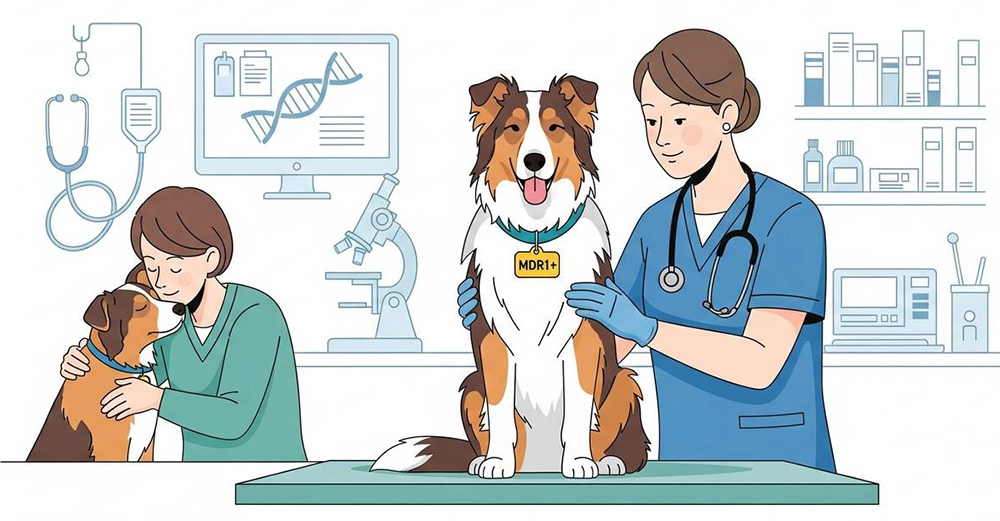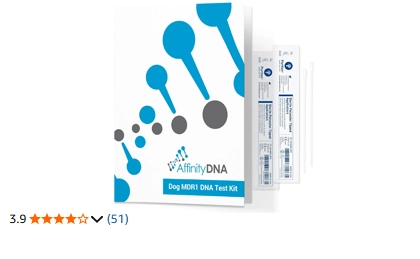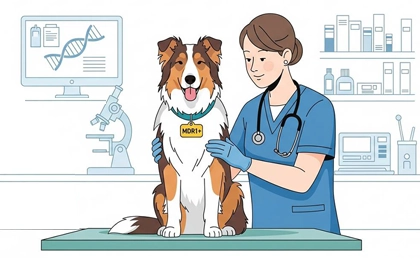The MDR1 gene mutation affects 1 in 7 Shelties and can cause toxic buildup of medications in the body. Here's what you need to know about this inherited disorder that affects how your Sheltie reacts to 20+ pet medications, from flea treatments to anesthesia.

When it functions correctly, the multidrug resistance 1 gene affects how drugs are transported and eliminated in the body. However, mutations in this gene can disrupt drug metabolism so that some dogs are at a high risk of experiencing drug toxicity.
Most dog owners—and even some veterinarians—are not aware of this risk despite the mutation affecting a significant number of herding dogs and sighthounds. Not only can small doses of over-the-counter medications become toxic, but procedures that require general anesthesia like desexing or dental surgery carry higher complication risks.
| Dog Breed | MDR1 Mutation Frequency |
| Collie | 70% |
| Australian Shepherd | 50% |
| Mini Australian Shepherd | 50% |
| Long-haired Whippet | 50% |
| Silken Windhound | 30% |
| Chinook | 25% |
| Shetland Sheepdog | 15% |
| English Shepherd | 15% |
| German Shepherd | 10% |
Source: Washington State University College of Veterinary Medicine
How Does The MDR1 Gene Affect Shelties?
The MDR1 gene tells cells how to make a transporter protein called P-glycoprotein. This protein carries certain drugs across the blood-brain barrier at a rate that prevents toxic buildup in the brain. It is a natural safety mechanism in dogs against toxic accumulation.
But dogs with a mutation in the MDR1 gene lose this safety feature. Now, certain drugs can build up in the brain, leading to dangerous reactions. Specifically, we're looking out for:
1. Drug Hypersensitivity
Standard doses of certain drugs—such as ivermectin, loperamide, vincristine, vinblastine, and some anti-inflammatories—can be toxic to sensitive MDR1-mutated dogs. Severe neurological side effects show up in MDR1-positive Shelties as vomiting, tremors, confusion, or seizures.
2. Anesthesia and Surgery
Certain anesthetic and sedative drugs can remain in circulation longer in MDR1-positive dogs, making routine procedures like spaying, neutering, and dental scaling higher risk. Vets must be vigilant with Shelties if their MDR1 status is unknown, as statistically 1 in 7 will have an unexpected reaction. Vets must select anesthetic drugs with the MDR1 effect in mind, administer drugs slowly, insert an additional IV line for emergency interventions, and monitor the dog closely to prevent any dangerous side effects.
3. Toxicity Symptoms
Symptoms of MDR1-mediated toxicity in dogs occur shortly after exposure to certain drugs. Vomiting, diarrhea, tremors, and seizures are early warning signs, along with disorientation, salivation, and drowsiness. Prompt diagnosis and treatment are vital to prevent the possibility of brain damage or even death.
4. Chronic Medication
Chronic conditions in Shelties, from anti-inflammatory treatments to chemotherapy, require long-term courses of drugs which can accumulate and cause toxic effects. Find out the MDR1 status of your Sheltie with an at-home genetic test and if positive, your vet can create an individualized treatment plan to prevent cumulative neurological damage.
5. Over-the-Counter Drugs and Environment
Even over-the-counter dewormers or flea shampoos applied topically can be toxic to MDR1-positive dogs. Read labels carefully and consult with your vet before you give your Sheltie any new drug.
A Two-Year-Old Sheltie with the MDR1 Gene
A well-documented case reported by clinicians at Washington State University highlights how the MDR1 mutation can lead to severe drug reactions in Shelties. In this case, a two-year-old Shetland Sheepdog was treated with ivermectin for routine parasite prevention. Within hours, the dog began showing neurological symptoms including ataxia (loss of balance), hypersalivation, and tremors.
After hospitalization and supportive care, genetic testing confirmed that the Sheltie carried two copies of the MDR1 mutation, confirmed to cause severe drug sensitivity. This explained the toxic accumulation of ivermectin in the brain due to the absence of functional P-glycoprotein transporters. The dog's veterinarian developed an individualized medication plan to exclude all drugs known to be substrates of the MDR1 transporter. Fortunately, the Sheltie recovered fully with proper monitoring and medication adjustments.
What Drugs Affect MDR1-Positive Shelties?
According to the WSU study, MDR1-related problem drugs include:
| Drug Name | Brand Name |
| Acepromazine | PromAce, Aceprotabs, Aceproject, Acezine, ACP |
| Afoxolaner | NexGard, Frontpro |
| Apomorphine | Apometic, Emedog |
| Butorphanol | Torbugesic, Torbutrol, Dolorex |
| Cyclosporine | Atopica, Optimmune, Sporimune |
| Doxorubicin | Adriamycin, Rubex, Doxil, Caelyx, Myocet |
| Fluralaner | Bravecto |
| Grapiprant | Galliprant |
| Ivermectin | Heartgard, Iverhart, Tri-Heart, Pet Trust, Acarexx, Nuheart, Valuheart |
| Loperamide | Imodium, Diamode, Difixn |
| Maropitant | Cerenia, Prevomax |
| Milbemycin | Interceptor, MilbeGuard, Milbehart, Bravecto, Milbemax, Milpro, NexGard, Sentinel, Trifexis |
| Moxidectin | ProHeart, Simparica, NexGard, Advantage, Credelio |
| Ondansetron | Zofran, Periset, Ondem |
| Sarolaner | Simparica |
| Selamectin | Revolution, Stronghold, Paradyne, Chanhold, Selarid, Senergy, Neovela, Selapro, Revolt, Wagg & Purr |
| Vinblastine | Velban, Alkaban-AQ, Cytoblastin |
| Vincristine | Oncovin, Vincasar |
| Vinorelbine | Navelbine |
How to Test for The MDR1 Gene in Shelties
The MDR1 gene mutation test is done with a cheek swab. Either book an appointment with your vet or order an at-home MDR1 gene test for an accurate and affordable result.
Genetic testing is valuable for all breeds with recent mixed ancestry, as well as herding dogs and sighthounds which are affected by the MDR1 gene mutation at a higher rate. If your dog is diagnosed as MDR1-positive, it will help you and your vet make better informed decisions about surgery and medication for the rest of your dog's life.
As well as genetic testing, vets can also keep comprehensive records like veterinary SOAP notes to track treatment plans and document adverse reactions. Good record-keeping ensures your dog receives better individualized care and reduces the chance they'll ever be given toxic doses of MDR1-affected medications.
Pet owners also have a role alongside veterinarians. Knowing how to look after your dog at home supports veterinary care. Specifically, you can:
- Maintain a full history of all your dog's medications
- Tell your vet your Sheltie's MDR1 status before any procedure
- Exercise caution when using over-the-counter drug treatments
- Watch for any signs of drug sensitivity
- Discuss all new drugs and supplements with your veterinarian
Final Thoughts
A mutation of the MDR1 gene in Shelties has a significant impact on drug metabolism. Common over-the-counter drugs can have unexpected toxic effects, while prescribed drugs like anesthesia and surgery must be planned with extra caution to avoid life-threatening reactions.
Early genetic testing can reveal if your dog is at risk. While their genetic status is fixed for life and can't be changed or cured, knowing your dog's MDR1 status allows you to take precautionary measures towards all medications they receive during their lifetime.
Care starts before the clinic. Vendors and distributors play a crucial role in providing high-quality medications, vaccines, and breed-specific supplies to veterinary clinics. International vendors and distributors can explore DVM Central to expand their reach into the US market. This platform allows international suppliers to showcase their essential products and connect directly with clinics across the United States.










